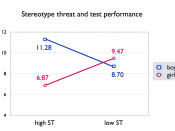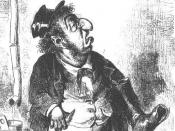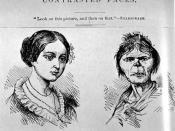Stereotypes are characteristics given to a group of people based on appearance rather than personality. Prejudice is the act of judging someone based on a stereotype. (Westen, D., Burton, L., &Kowalski, R., 2006) Stereotypes are helpful because they save cognitive energy. (Macrae, C. N., Milne A. B., & Bodenhausen, G. V., 1994). Prejudice is harmful because it can lead to discrimination. Examples of harmful prejudice are the racial prejudice shown towards the Australian Aborigines and the different kinds of prejudice being old fashioned prejudice and modern prejudice. There is an indirect relationship between stereotypes and prejudice, outside factors such as emotion intervene and modify this relationship.
Stereotypes have been shown to influence social information processing, the interpretation of information and, inferences and judgements made from that information. (Johnston, L., Locke, V., Giles, L., & Rattray, K, 1997) Once activated, stereotype consistent information receives more concentration than stereotype-inconsistent information. This allows for judgments to be made in a stereotype-consistent approach.
This method of information processing conveys the usefulness of stereotypes, as they allow for data reduction, and generally direct attention to related information. Once activated, stereotypes ease the work load of information processing by directing and processing resources to congruent information. This however can have a negative output, as sometimes we see negative stereotypes of various groups of people according to race, gender, etc. This however, according to the study of Lucy Johnston and Vance Locke (1997) was shown that many stereotypes contain both positive and negative components. Another study by Devine (1989) shows that automatically activated stereotype congruent or prejudice like responses are independent of ones current actions and beliefs. There are individuals whom reject a negative stereotype on a person or group and respond in a non prejudice way. (Devine, P. G., 1989) From this study we can see...


